- Home
- Dan Simmons
Hyperion 01 - Hyperion Page 11
Hyperion 01 - Hyperion Read online
Page 11
I no longer believe that any surgery or treatment can cure me of this thing that infests me, but if someone can separate it and study it and destroy it, even at the cost of my death, I will be well satisfied.
The flame forests are as quiet as they will ever be. To bed now. I leave before dawn.
Day 215:
There is no way out.
Fourteen kilometers into the forest. Stray fires and bursts of current, but penetrable. Three weeks of walking would have got me through.
The cruciform will not let me go.
The pain was like a heart attack that would not stop. Still I staggered forward, stumbling and crawling through the ash. Eventually I lost consciousness. When I came to I was crawling toward the Cleft. I would turn away, walk a kilometer, crawl fifty meters, then lose consciousness again and awake back where I had started. All day this insane battle for my body went on.
Before sunset the Bikura entered the forest, found me five kilometers from the Cleft, and carried me back.
Dear Jesus, why have you let this be?
There is no hope now unless someone comes looking for me.
Day 223:
Again the attempt. Again the pain. Again the failure.
Day 257:
I am sixty-eight standard years old today. Work goes on with the chapel I am building near the Cleft. Attempted to descend to the river yesterday but was turned back by Beta and four others.
Day 280:
One local year on Hyperion. One year in purgatory. Or is it hell?
Day 311:
Working on quarrying stones on the ledges below the shelf where the chapel is going up and I made the discovery today: the arrestor rods. The Bikura must have thrown them over the edge when they murdered Tuk that night two hundred and twenty-three days ago.
These rods would allow me to penetrate the flame forest at any time if the cruciform would allow it. But it will not. If only they had not destroyed my medkits with the painkillers! But still, sitting here holding the rods today, I have an idea.
My crude experiments with the medscanner have continued. Two weeks ago when Theta broke his leg in three places, I observed the reaction of the cruciform. The parasite did its best to block the pain; Theta was unconscious much of the time and his body was producing incredible quantities of endorphins. But the break was a very painful one and after four days die Bikura slashed Theta’s throat and took his body to the basilica. It was easier for the cruciform to resurrect his corpse than to tolerate such pain over a long period. But before his murder my scanner showed an appreciable retreat of the cruciform nematodes from some parts of the central nervous system.
I do not know if it would be possible to inflict on oneself—or to tolerate—levels of nonlethal pain sufficient to drive the cruciform out completely, but I am sure of one thing: the Bikura would not allow it.
Today I sit on the ledge below the half-finished chapel and I consider possibilities.
Tonight, when the Bikura went down into the Cleft for their daily parody of worship, I said Mass at the altar of the newly erected chapel. I had baked the bread from chalma flour and I am sure that it must have tasted of that bland, yellow leaf, but to me the taste was exactly like that of the first Host I had partaken of during my first Holy Communion in Villefranche-sur-Saône some sixty standard years earlier.
In the morning I will do what I have planned. Everything is in readiness: my journals and the medscan wafers will be in the pouch of woven bestos fibers. That is the best I can do.
The consecrated wine was only water, but in the dim light of sunset it looked blood red and tasted of Communion wine.
The trick will be to penetrate deep enough into the flame forest. I will have to trust that there is enough incipient activity in and from the tesla trees even during the quiet periods.
Goodbye, Edouard. I doubt if you are still alive, and should you be, I see no way that we could ever be reunited, separated as we are not only by years of distance but by a much wider gulf in the form of a cross. My hope of seeing you again shall not be placed on this life but on the one to come. Strange to hear me speak like this again, is it not? I must tell you, Edouard, that after all these decades of uncertainty, and with great fear of what lies ahead, my heart and soul are nonetheless at peace.
Oh, my God,
I am heartily sorry for having offended Thee,
And I detest all my sins,
Because of the loss of heaven
And the pains of hell,
But most of all because I have offended Thee,
My God,
Who art all good
And deserving of all my love.
I firmly resolve with the help of Thy grace to confess my sins, to do penance,
And to amend my life,
Amen.
2400 hours:
The sunset comes through the open chapel window and bathes the altar, the crudely carved chalice, and me in light. The wind from the Cleft rises in the last such chorus that—with luck and God’s mercy—I will ever hear.
“That is the final entry,” said Lenar Hoyt.
When the priest quit reading, the six pilgrims at the table raised their faces toward him as if they were awakening from a common dream. The Consul glanced upward and saw that Hyperion was much closer now, filling a third of the sky, banishing the stars with its cold radiance.
“I arrived some ten weeks after I had last seen Father Duré,” continued Father Hoyt. His voice was a hoarse rasp. “More than eight years had passed on Hyperion … seven years since the last entry in Father Duré’s journal.” The priest was visibly in pain now, his face paled to a sick luminescence and filmed with perspiration.
“Within a month I found my way to Perecebo Plantation upriver from Port Romance,” he continued, forcing some strength into his voice. “My assumption was that the fiberplastic growers might tell me the truth even if they would have nothing to do with the consulate or Home Rule Authorities. I was right. The administrator at Perecebo, a man named Orlandi, remembered Father Duré, as did Orlandi’s new wife, the woman named Semfa whom Father Duré mentioned in his journals. The plantation manager had tried to mount several rescue operations onto the Plateau, but an unprecedented series of active seasons in the flame forests had made them abandon their attempts. After several years they had given up hope that Duré or their man Tuk could still be alive.
“Nonetheless, Orlandi recruited two expert bush pilots to fly a rescue expedition up the Cleft in two plantation skimmers. We stayed in the Cleft itself for as long as we could, trusting to terrain-avoidance instruments and luck to get us to Bikura country. Even with by-passing most of the flame forest that way, we lost one of the skimmers and four people to tesla activity.”
Father Hoyt paused and swayed slightly. Gripping the edge of the table to steady himself, he cleared his throat and said, “There’s little else to tell. We located the Bikura village. There were seventy of them, each as stupid and uncommunicative as Duré’s notes had suggested. I managed to ascertain from them that Father Duré had died while trying to penetrate the flame forest. The bestos pouch had survived and in it we found his journals and medical data.” Hoyt looked at the others a second and then glanced down. “We persuaded them to show us where Father Duré had died,” he said. “They … ah … they had not buried him. His remains were badly burned and decomposed but complete enough to show us that the intensity of the tesla charges had destroyed the … the cruciform … as well as his body.
“Father Duré had died the true death. We returned the remains to the Perecebo Plantation where he was buried following a full funeral Mass.” Hoyt took a deep breath. “Over my strong objections, M. Orlandi destroyed the Bikura village and a section of the Cleft wail with shaped nuclear charges he had brought from the plantation. I do not believe that any of the Bikura could have survived. As far as we could tell, the entrance to the labyrinth and the so-called basilica also must have been destroyed in the landslide.
“I had sustained s
everal injuries during the expedition and thus had to remain at the plantation for several months before returning to the northern continent and booking passage to Pacem. No one knows of these journals or their contents except M. Orlandi, Monsignor Edouard, and whichever of his superiors Monsignor Edouard chose to tell. As far as I know, the Church has issued no declaration relating to the journals of Father Paul Duré.”
Father Hoyt had been standing and now he sat. Sweat dripped from his chin and his face was blue-white in the reflected light of Hyperion.
“Is that … all?” asked Martin Silenus.
“Yes,” managed Father Hoyt.
“Gentlemen and lady,” said Het Masteen, “it is late. I suggest that you gather your luggage and rendezvous at our friend the Consul’s ship on sphere 11 in thirty minutes or sooner. I will be using one of the tree’s dropships to join you later.”
Most of the group was assembled in less than fifteen minutes. The Templars had rigged a gangway from a work pier on the interior of the sphere to the ship’s top-tier balcony, and the Consul led the way into the lounge as crew clones stowed luggage and departed.
“A fascinating old instrument,” said Colonel Kassad as he ran one hand across the top of the Steinway. “Harpsichord?”
“Piano,” said the Consul. “Pre-Hegira. Are we all here?”
“Everyone except Hoyt,” said Brawne Lamia as she took a seat in the projection pit.
Het Masteen entered. “The Hegemony warship has granted permission for you to descend to Keats’s spaceport,” said the Captain. He glanced around. “I will send a crew member to see if M. Hoyt needs assistance.”
“No,” said the Consul. He modulated his voice. “I’d like to get him. Can you tell me the way to his quarters?”
The treeship Captain looked at the Consul for a long second and then reached into the folds of his robe. “Bon voyage,” he said, handing over a wafer. “I will see you on the planet, sometime before our midnight departure time from the Shrike’s Temple in Keats.”
The Consul bowed. “It was a pleasure traveling within the protective branches of the Tree, Het Masteen,” he said formally. Turning to the others, he gestured. “Please make yourselves comfortable in the lounge or the library on the deck below this. The ship will see to your needs and answer any questions you might have. We will depart as soon as Father Hoyt and I return.”
The priest’s environment pod was halfway up the treeship, far out on a secondary branch. As the Consul expected, the comlog direction wafer Het Masteen had given him also served as a palmlock override. After useless minutes tapping the announcer chime and pounding on the access portal, the Consul triggered the override and stepped into the pod.
Father Hoyt was on his knees, writhing in the center of the grass carpet. Bedclothes, gear, garments, and the contents of a standard medkit were strewn on the floor around him. He had torn off his tunic and collar and sweated through his shirt so that it now hung in damp folds, ripped and tattered where he had clawed through the fabric. Hyperion light seeped through the pod wall, making the bizarre tableau appear to be staged underwater—or, thought the Consul, in a cathedral.
Lenar Hoyt’s face contorted in agony as his hands raked at his chest. Muscles on his exposed forearms writhed like living creatures moving beneath his pale tarp of a skin. “The injector … malfunctioned” gasped Hoyt. “Please.”
The Consul nodded, commanded the door to close, and knelt next to the priest. He removed the useless injector from Hoyt’s clenched fist and ejected the syrette ampule. Ultramorphine. The Consul nodded again and took out an injector from the medkit he had brought from his ship. It took less than five seconds to load the ultramorph.
“Please” begged Hoyt. His whole body spasmed. The Consul could almost see the waves of pain passing through the man.
“Yes,” said the Consul. He took a ragged breath. “But first the rest of the story.”
Hoyt stared, reached weakly for the injector.
Sweating himself now, the Consul held the instrument just out of reach. “Yes, in a second,” he said. “After the rest of the story. It’s important that I know.”
“Oh, God, sweet Christ,” sobbed Hoyt. “Please!”
“Yes,” gasped the Consul. “Yes. As soon as you tell me the truth.”
Father Hoyt collapsed onto his forearms, breathing in quick pants. “You fucking bastard,” he gasped. The priest took several deep breaths, held one until his body quit shaking, and tried to sit up. When he looked at the Consul, there was something like relief in the maddened eyes. “Then … you’ll give me … the shot?”
“Yes,” said the Consul.
“All right,” Hoyt managed in a sour whisper. “The truth. Perecebo Plantation … like I said. We flew in … early October … Lycius … eight years after Duré … disappeared. Oh, Christ, it hurts! Alcohol and endos don’t work at all anymore. Only … pure ultramorph …”
“Yes,” whispered the Consul. “It’s ready. As soon as the story is done.”
The priest lowered his head. Sweat dripped from his cheeks and nose onto the short grass. The Consul saw the man’s muscles tense as if he were going to attack, then another spasm of pain wracked the thin body and Hoyt sagged forward. “Skimmer wasn’t destroyed … by tesla. Semfa, two men, and I … forced down near the Cleft while … while Orlandi searched upriver. His skimmer … had to wait while the lightning storm died down.
“Bikura came in the night. Killed … killed Semfa, the pilot, the other man … forget his name. Left me … alive.” Hoyt reached for his crucifix, realized that he had torn it off. He laughed briefly, stopping before the laughter turned to sobs. “They … told me about the way of the cross. About the cruciform. Told me about … the Son of the Flames.
“Next morning, they took me to see the Son. Took me … to see him.” Hoyt struggled upright and clawed at his own cheeks. His eyes were wide, the ultramorph obviously forgotten despite the pain. “About three kilometers into the flame forest … big tesla … eighty, a hundred meters tall, at least. Quiet then, but still a lot … a lot of charge in the air. Ash everywhere.
“The Bikura wouldn’t … wouldn’t go too close. Just knelt there with their goddamned bald heads bowed. But I … went close … had to. Dear God … Oh, Christ, it was him. Duré. What was left of him.
“He’d used a ladder to get three … maybe four meters … up on the bole of the tree. Built a sort of platform. For his feet. Broken the arrestor rods off … little more than spikes … then sharpened them. Must’ve used a rock to drive the long one through his feet into the bestos platform and tree.
“His left arm … he’d pounded the stake between the radius and ulna … missed veins … just like the goddamned Romans. Very secure as long as his skeleton was intact. Other hand … right hand … palm down. He’d driven the spike first. Sharpened both ends. Then … impaled his right hand. Somehow bent the spike over. Hook.
“Ladder’d fallen … long ago … but it was bestos. Hadn’t burned. Used it to climb up to him. Everything’d burned away years ago … clothes, skin, top layers of flesh … but the bestos pouch was still around his neck.
“The alloy spikes still conducted current even when … I could see it … feel it … surging through what was left of the body.
“It still looked like Paul Duré. Important. I told Monsignor. No skin. Flesh raw or boiled away. Nerves and things visible … like gray and yellow roots. Christ, the smell. But it still looked like Paul Duré!
“I understood then. Understood it all. Somehow … even before reading the journals. Understood he’d been hanging there … oh, dear God … seven years. Living. Dying. The cruciform … forcing him to live again. Electricity … surging through him every second of those … those seven years. Flames. Hunger. Pain. Death. But somehow the goddamned … cruciform … leeching substance from the tree maybe, the air, what was left … rebuilding what it could … forcing it to live, to feel the pain, over and over and over.…
“But he won. Pain wa
s his ally. Oh, Jesus, not a few hours on the tree and then the spear and Test, but seven years!
“But … he won. When I removed the pouch, the cruciform on his chest fell away also. Just … fell right off … long, bloody roots. Then the thing … the thing I’d been sure was a corpse … the man raised its head. No eyelids. Eyes baked white. Lips gone. But it looked at me and smiled. He smiled. And he died … really died … there in my arms. The ten thousandth time, but real this time. He smiled at me and died.”
Hoyt stopped, communed in silence with his own pain, and then continued between bouts of clenching his teeth. “Bikura took me … back to … Cleft. Orlandi came the next day. Rescued me. He … Semfa … I couldn’t … he lasered the village, burned the Bikura where they stood like stupid sheep. I didn’t … didn’t argue with him. I laughed. Dear God, forgive me. Orlandi nuked the site with shaped charges they used to … to clear the jungle … fiberplastic matrix.”
Hoyt looked directly at the Consul and made a contorted gesture with his right hand. “The painkillers worked all right at first. But every year … every day … got worse. Even in fugue … the pain. I would have had to come back anyway. How could he … seven years! Oil, Jesus,” said Father Hoyt and clawed at the carpet.
The Consul moved quickly, injecting the full ampule of ultramorph just under the armpit, catching the priest as he collapsed, and gently lowering the unconscious form to the floor. His vision unclear, the Consul ripped open Hoyt’s sweat-sodden shirt, casting the rags aside. It was there, of course, lying under the pale skin of Hoyt’s chest like some great, raw, cross-shaped worm. The Consul took a breath and gently turned the priest over. The second cruciform was where he had expected to find it, a slightly smaller, cross-shaped welt between the thin man’s shoulder blades. It stirred slightly as the Consul’s fingers brushed the fevered flesh.

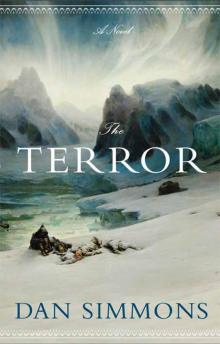 The Terror
The Terror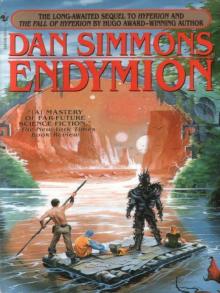 Endymion
Endymion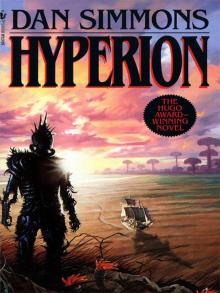 Hyperion
Hyperion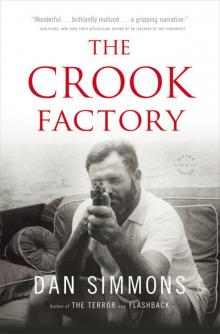 The Crook Factory
The Crook Factory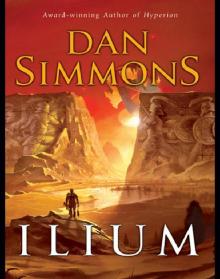 Ilium
Ilium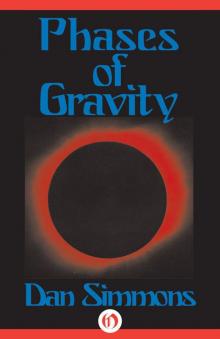 Phases of Gravity
Phases of Gravity Hardcase
Hardcase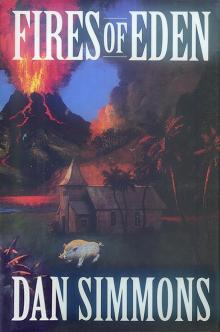 Fires of Eden
Fires of Eden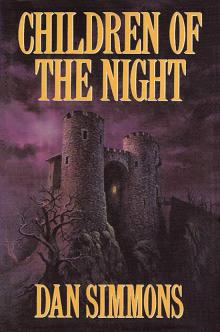 Children of the Night
Children of the Night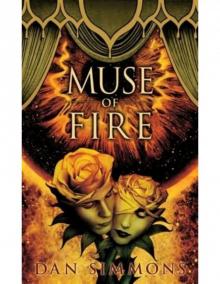 Muse of Fire
Muse of Fire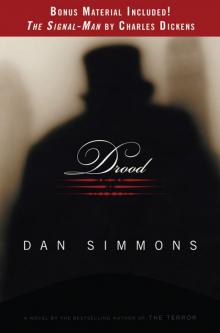 Drood
Drood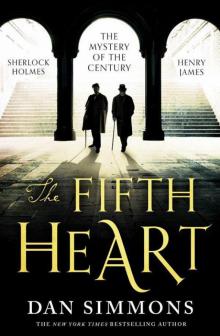 The Fifth Heart
The Fifth Heart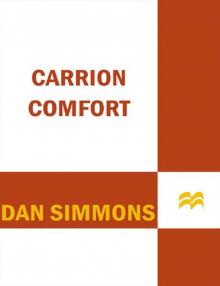 Carrion Comfort
Carrion Comfort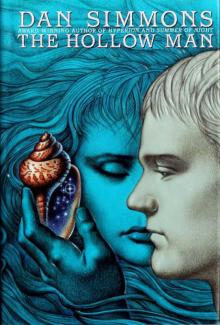 The Hollow Man
The Hollow Man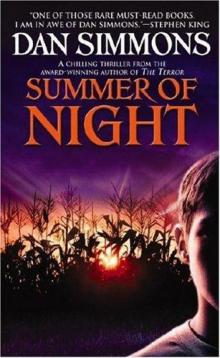 Summer of Night
Summer of Night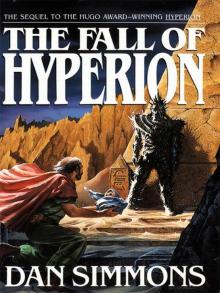 The Fall of Hyperion
The Fall of Hyperion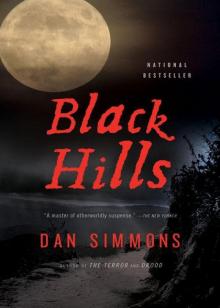 Black Hills
Black Hills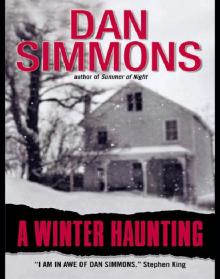 A Winter Haunting
A Winter Haunting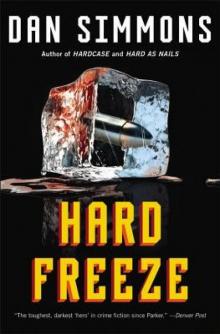 Hard Freeze
Hard Freeze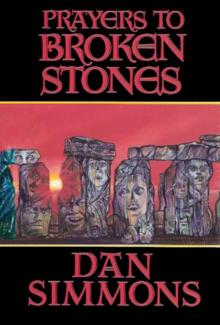 Prayers to Broken Stones
Prayers to Broken Stones Hard as Nails
Hard as Nails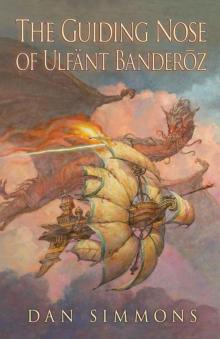 The Guiding Nose of Ulfant Banderoz
The Guiding Nose of Ulfant Banderoz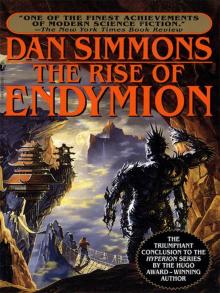 The Rise of Endymion
The Rise of Endymion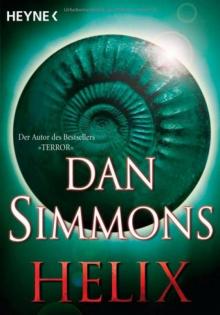 Orphans of the Helix
Orphans of the Helix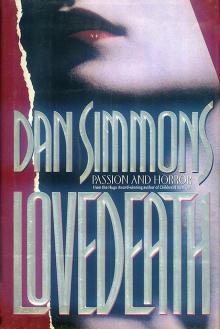 Lovedeath
Lovedeath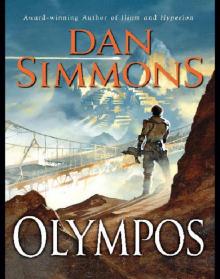 Olympos
Olympos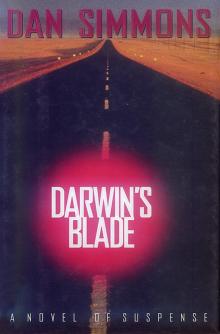 Darwin's Blade
Darwin's Blade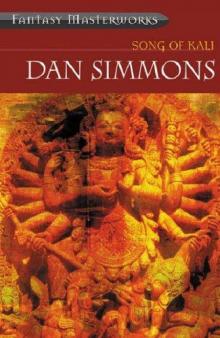 Song of Kali
Song of Kali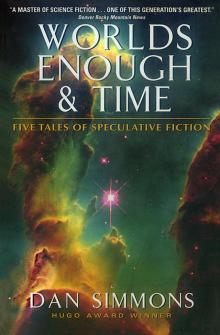 Worlds Enough & Time: Five Tales of Speculative Fiction
Worlds Enough & Time: Five Tales of Speculative Fiction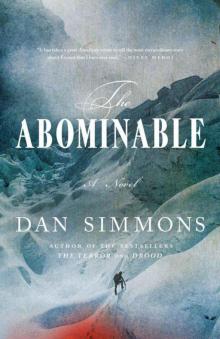 The Abominable
The Abominable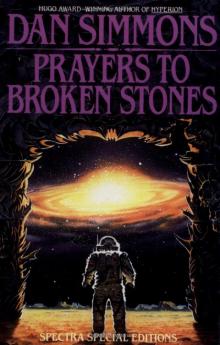 The Death of the Centaur
The Death of the Centaur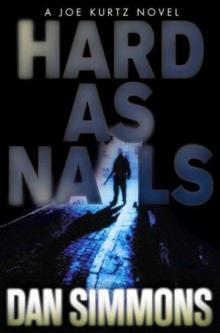 Hard as Nails jk-3
Hard as Nails jk-3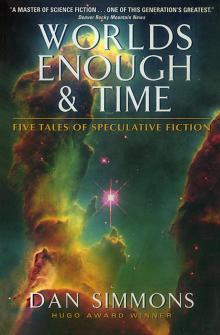 Worlds Enough & Time
Worlds Enough & Time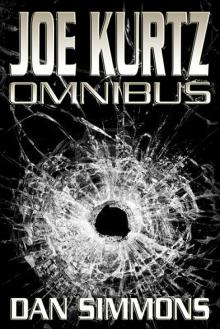 Joe Kurtz Omnibus
Joe Kurtz Omnibus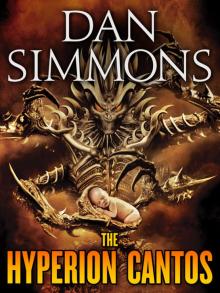 The Hyperion Cantos 4-Book Bundle
The Hyperion Cantos 4-Book Bundle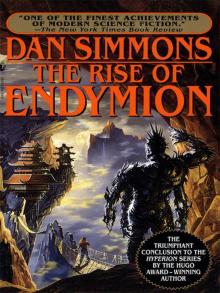 Rise of Endymion
Rise of Endymion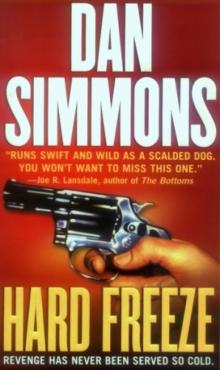 Hard Freeze jk-2
Hard Freeze jk-2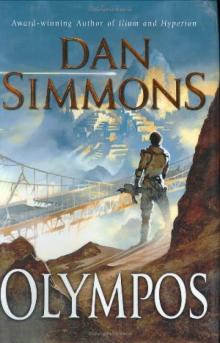 Olympos t-2
Olympos t-2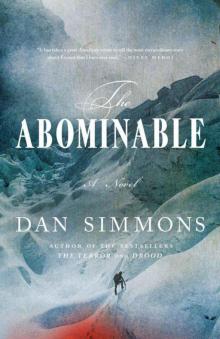 The Abominable: A Novel
The Abominable: A Novel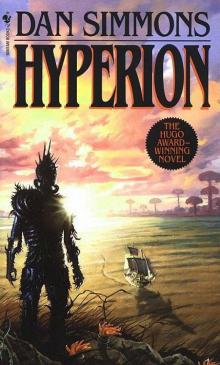 Hyperion h-1
Hyperion h-1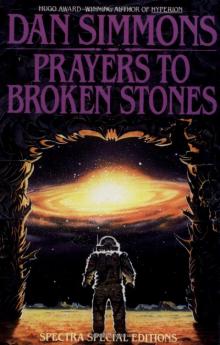 Remembering Siri
Remembering Siri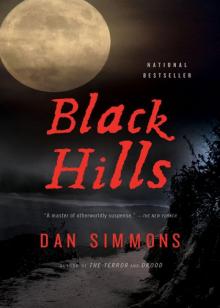 Black Hills: A Novel
Black Hills: A Novel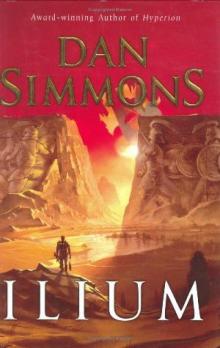 Ilium t-1
Ilium t-1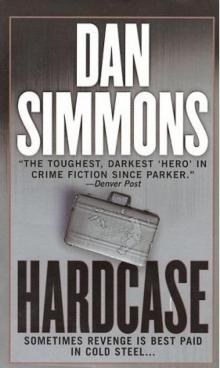 Hardcase jk-1
Hardcase jk-1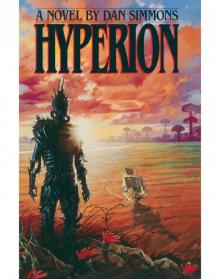 Hyperion 01 - Hyperion
Hyperion 01 - Hyperion